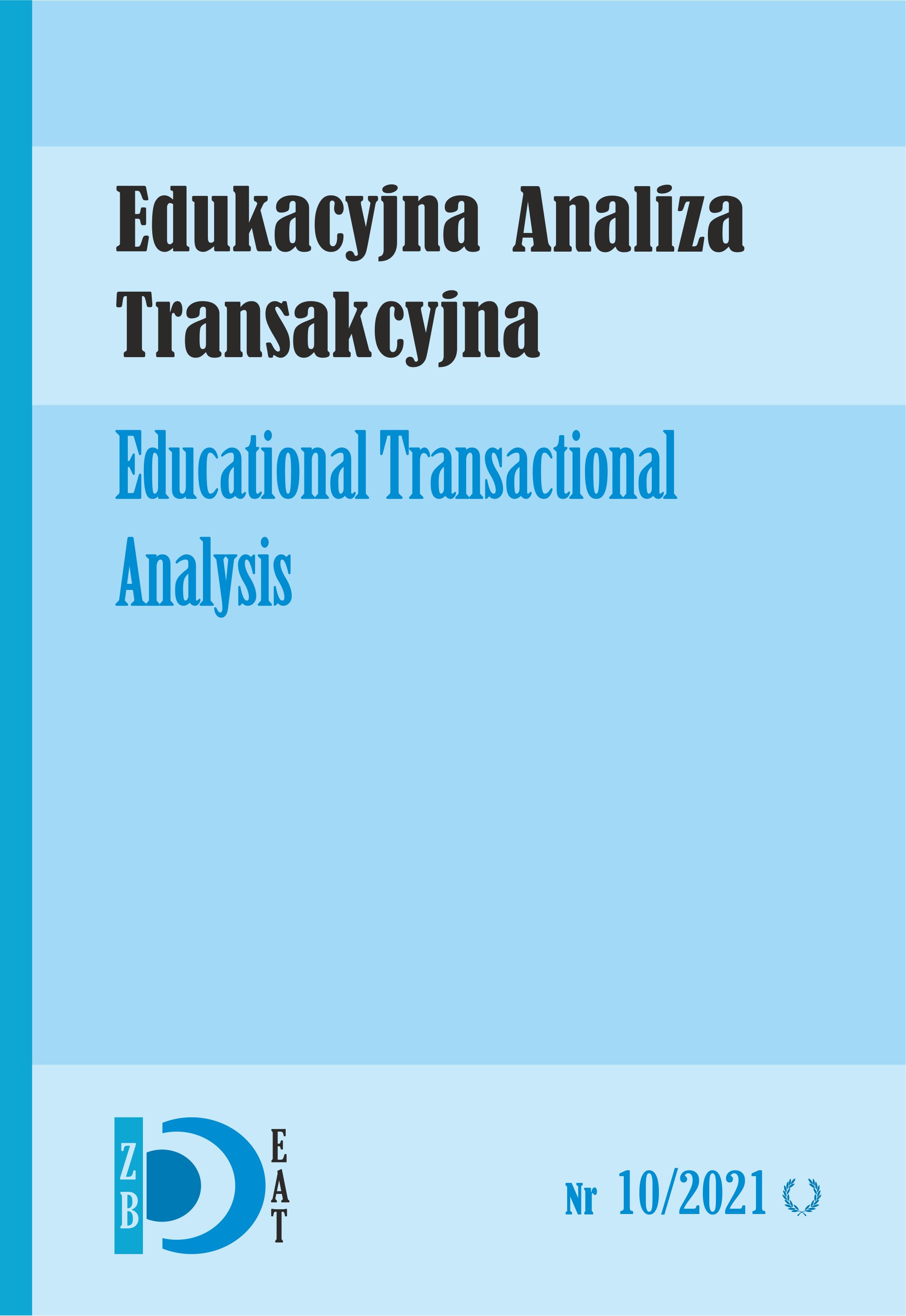The Pandemic as an impulse for the reflections of pedagogy students – the point of view of qualitative analysis
DOI:
https://doi.org/10.16926/eat.2021.10.10Keywords:
the pandemic, COVID-19, lockdown, reflectiveness, subjectivity, nature, enviroment, the grounded theoryAbstract
The article presents selected extracts of qualitative research results on the psychological and social situation experienced by people during the time of the COVID-19 pandemic in the opinion of pedagogy students. An attempt to prevent the virus from spreading by introducing lockdown confined millions of people in their homes, limited their freedom and interpersonal contacts. For many, this time was an impulse for a more profound existential reflection. The researchers, interested in the issue of students’ reflectiveness, asked a group of them to prepare short essays collecting reflections dating back to the first wave of the pandemic. The research involved 36 students of the Academy of Special Education, in two age groups – those beginning their studies and those heading towards the end. The gathered texts were subject to an analysis complying with the methodology of the grounded theory. The discourse analysis performed from the interpretative perspective allowed for selecting 4 key categories in the students’ comments, and then for pointing to differences between the groups as far as the issues discussed were concerned. This article presents the results of the research encompassing two categories: reflections of the subjects on their own subjectivity and reflections concerning their ecological identity. The younger subjects demonstrated a bigger concentration on the personal perspective and their comments were more emotional and optimistic. The older ones, more distanced towards reality, more often reflected bitterly on social policy, consumerism and egotism of modern societies, more frequently treating the pandemic not as a goal on its own but as a starting point for broader social and ecological criticism.Downloads
References
Bauman Z. (1999), Globalizacja. I co z tego dla ludzi wynika, Warszawa: PIW;
Bauman, Z. (2006). Płynna nowoczesność, Kraków.
Chutorański, M. (2021). Nie(tylko) ludzkie wymiary edukacji. W stronę pedagogiki nieantropozoficznej. Szczecin: Wydawnictwo Naukowe Uniwersytetu Szczecińskiego.
Chwalibóg, F. (1929). Aforyzmy, refleksje i nowe przysłowia. Kraków. Pobrane z: https://zbc.uz.zgora.pl/dlibra/show-content/publication/edition/17294?id=17294 [dostęp: 22.09.2021].
Damiano, A. D., Allen Catellier, J. R. (2020). A Content Analysis of Coronavirus Tweets in the United States Just Prior to the Pandemic Declaration. Cyberpsychology, Behavior, and Social Networking. Dec 2020, p. 889-893.http://doi.org/10.1089/cyber.2020.0425
Eliade, M. (2001). Szamanizm i archaiczne techniki ekstazy. Warszawa: Wydawnictwo Naukowe PWN.
European Green Party (2014). Europe, vote Green. Green Common Manifesto European Elections 2014, Brussels.
Galanciak, S., Siwicki, M. (2020). Students of pedagogy on social relations at the beginning of the pandemic – in the light of a qualitative analysis of their personal and social reflectiveness. Edukacyjna Analiza Transakcyjna, 9, 237–256.
Giddens A. (1990). The Consequences of Modernity, Stanford: Stanford University Press.
Giddens, A. (2010). Nowoczesność i tożsamość. „Ja” i społeczeństwo w epoce późnej nowoczesności. Warszawa: Wydawnictwo Naukowe PWN.
Halagiera, D. (2020). Analiza interakcji użytkowników portalu Facebook z nieprawdziwymi informacjami w dobie pandemii COVID-19. W: Marcinkiewicz, K., Nowak, P., Popielec, D., Wilk, M. (red.). Koronawirus wyzwaniem współczesnego społeczeństwa, Kraków – Wrocław: Polskie Towarzystwo Komunikacji Społecznej, Instytut Dziennikarstwa, Mediów i Komunikacji Społecznej Uniwersytetu Jagiellońskiego.
Karmolińska-Jagodzik E. (2014). Podmiotowość a tożsamość współczesnego człowieka w przestrzeni rodzinnej. Dyskurs teoretyczny. Studia Edukacyjne, 31, 2014, pp. 113-136.
Komuda, R., Rajda, K., Szczepkowski, J. (2020). Zdalni – solidarni w czasach pandemii koronawirusa. Analiza akcji i inicjatyw użytkowników Internetu w Polsce. W: Marcinkiewicz, K., Nowak, P., Popielec, D., Wilk, M. (red.). Koronawirus wyzwaniem współczesnego społeczeństwa, Kraków – Wrocław: Polskie Towarzystwo Komunikacji Społecznej, Instytut Dziennikarstwa, Mediów i Komunikacji Społecznej Uniwersytetu Jagiellońskiego.
Maslow, A. (1986). W stronę psychologii istnienia. Warszawa: PAX.
Melosik, Z. (2001). Młodzież i styl życia: paradoksy pop-tożsamości. W: Z. Melosik (red.), Młodzież. Styl życia i zdrowie. Poznań: Wydawnictwo Wolumin.
Nowak-Dziemianowicz, M. (2021). Style zarządzania w sytuacji krytycznej oraz ich konsekwencje w perspektywie edukacyjnych badań zaangażowanych. W: Łukasik J., Nowosad I., Szymański M. J. (red.). Szkoła i nauczyciel w obliczu zmian społecznych i edukacyjnych. Kraków: Impuls.
Nowicka, M. (2021). Rodzice o nauczycielach w czasach pandemii – doniesienie
badawcze z forów dyskusyjnych, [w:] Nowicka, M., Dziekońska, J. (red.),
Edukacja zdalna w cieniu pandemii - wielogłos akademicki. Toruń: Wydawnictwo
Adam Marszałek.
Roy, R., Uekusa, S. (2020), Collaborative autoethnography: “self-reflection” as a timely alternative research approach during the global pandemic, Qualitative Research Journal, Vol. 20 No. 4, pp. 383-392. https://doi.org/10.1108/QRJ-06-2020-0054
Steele B.J. (2008). Ontological Security in International Relations. Self-Identity and the IR State. New York - London: Routledge.
Troszyński, M., Bieliński, J., Bukowska, X., Iwińska, K., Markowska, B., Nowicka, M., Sałkowska, M. (2021), Czas pandemii w polskich mediach społecznościowych, Collegium Civitas, https://www.civitas.edu.pl/wp-content/uploads/2020/07/czas_pandemii_w_polskich_mediach_spolecznosciowych.pdf [dostęp: 09.09.2021]
Tsao, S.-F., Chen, H., Tisseverasinghe, T., Yang, Y., Li, L., Butt, Z., A. (2021). What social media told us in the time of COVID-19: a scoping review. Lancet Digit Health, Vol. 3, Issue 3, p. E-175-194, https://doi.org/10.1016/ S2589-7500(20)3031.
WHO, https://covid19.who.int/[dostęp: 31.08.2021]
Downloads
Published
How to Cite
Issue
Section
License
Copyright (c) 2022 Sylwia Galanciak, Marek Siwicki

This work is licensed under a Creative Commons Attribution 4.0 International License.
I am aware that the Educational Transactional Analysis journal is published under a Creative Commons license - Attribution (https://creativecommons.org/licenses/by/4.0/legalcode).
By submitting the article, I agree to make it available under this license

